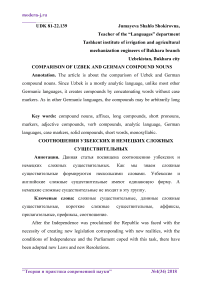Comparison of Uzbek and German compound nouns
Автор: Jumayeva Sh.sh.
Журнал: Теория и практика современной науки @modern-j
Рубрика: Основной раздел
Статья в выпуске: 4 (34), 2018 года.
Бесплатный доступ
The article is about the comparison of Uzbek and German compound nouns. Since Uzbek is a mostly analytic language, unlike most other Germanic languages, it creates compounds by concatenating words without case markers. As in other Germanic languages, the compounds may be arbitrarily long.
Compound nouns, affixes, long compounds, short pronouns, markers, adjective compounds, verb compounds, analytic language, german languages, case markers, solid compounds, short words, monosyllabic
Короткий адрес: https://sciup.org/140289480
IDR: 140289480
Текст научной статьи Comparison of Uzbek and German compound nouns
After the Independence was proclaimed the Republic was faced with the necessity of creating new legislation corresponding with new realities, with the conditions of Independence and the Parliament coped with this task, there have been adopted new Laws and new Resolutions.
For the first time in the history of our country, there adopted “The Law of the Republic of Uzbekistan on Education” and “The Law of the Republic of Uzbekistan on the National Programme of Personnel Training System”. The main objective of all reforms in the field of economic policy is the individual. Therefore the task of education, the task of rising up a new generation capable of national renaissance will remain the prerogative of the state and constitute a priority. At present great importance is attached to the study and teaching of foreign language. In our recent past, in most cases the Russian language but not the mother tongue served as mediator in the study of foreign languages. That is why in particular until the present, English-Uzbek and Uzbek-English Dictionaries had not been available.
That’s why it is necessary to learn and compare English, German and Uzbek lexicology, grammar and phonetics.
The main goal of the article is to study, compare and analyze the compound words of Uzbek, English and German, to classify the compounds according to morphological and lexical point of view.
Compound words are words consisting of at least two stems which occur in the language as free forms. In a compound word the immediate constituents obtain integrity and structural cohesion that make them function in a sentence as a separate lexical unit.
The structural cohesion and integrity of a compound may depend upon unity of stress, solid or hyphenated spelling, semantic unity, unity of morphological and syntactic functioning or, more often, upon the combined effect of several of these or similar phonetic, graphic, semantic, morphological or syntactic factors
Since Uzbek is a mostly analytic language, unlike most other Germanic languages, it creates compounds by concatenating words without case markers. As in other Germanic languages, the compounds may be arbitrarily long.
For example in German there are a lot of long compounds with more than three words: die Bewußtseinserziehung, achtzehnhundertzwölf
On the contrary Uzbek compounds are short compounds.
Ex: кузойнак, атиргул, бутакуз, ток^айчи.
The way of forming Uzbek and English short compounds are the same, while German is not included to this group. There are three ways of forming short compounds
-
1 . The solid or closed form in which two usually moderately short words appear together as one. Solid compounds most likely consists of short (monosyllabic) units that often have been established in the language for a long time. Examples are; housewife, lawsuit, and wallpaper.
-
2 .The hyphenated form in which two or more words are connected by a hyphen. Compounds that contain affixes, such as house – builder and single – mind (ed) (ness) but if these words are written in Uzbek they will be written without hyphen: single – mindedness – ҳурфикрлилик.
-
3 .The open or spaced form consisting of newer combinations of usually longer, such as: distance learning, player piano, lawn tennis.
Uzbek examples are: сувилон, тоғолча, гултувак.
This rule is also relevant to German compounds.
These are examples: Kraftwerk, die Kinderbibliothek.
As well as adjective - adjective compounds and verb – verb compounds, such as blue – green and freeze – dry, are often hyphenated. Some Uzbek verb – verb compounds are also hyphenated: сотиб - олди, бориб - келди.
But in German there is no hyphenated compound. In addition to it there are some verb – verb compounds in German: kennenlernen, bleibenstehe.
In Uzbek there are also such kind of open compounds: стол тенниси, масофавий ўқитиш.
But German is far from this rule: All German compounds words are written together. A compound word possesses a single semantic structure. The meaning of the compound is first of all derived from the combined lexical meanings of its components, which as a rule; retain their lexical meanings, although their semantic range becomes considerably narrowed. The lexical meanings of the components are closely fused together to create a new semantic unit with a new meaning that is not merely additive but dominates the individual meanings of the components. The semantic centre of the compound is found in the lexical meaning of the second component which is modified and restricted by the lexical meaning of the first, e.g. hand-bag is essentially 'a bag carried in the hand for money, papers, facepowder, etc.'; pencil-case is 'a case for pencils', etc.
Список литературы Comparison of Uzbek and German compound nouns
- Karimov I.A. Harmoniously Developed Generation is the basis of Progress of Uzbekistan. T. "Shark" 1998. p. 9.
- Buranov J.B, Muminov A.A. Practical Course in English Lexicology. T. "Ukituvchi" 1990. p. 54.
- Arnold I. V. The English Word. M. "BШ". 1973. р. 60.
- Мюллер. В.К. «Англо - Русский словарь» М. 1962.
- 5.The World Book Encyclopedia. USA. 1994. №. G.G. Volume p/ 905
- Эшниёзова М. Қўшма сўз Микросинтагматик муносататига доир. 2004. №1,24-26.б
- Khan M.A. Liggt. Privacy Policy. Terms of Use. www.amjbot.org. 2003.№90р
- http://www.wikipedia.com/English/compounds/.htm
- http://www mpsttu.ru/works/english lexicology/ htm
- http://www.yahoo.com/english/.htm


